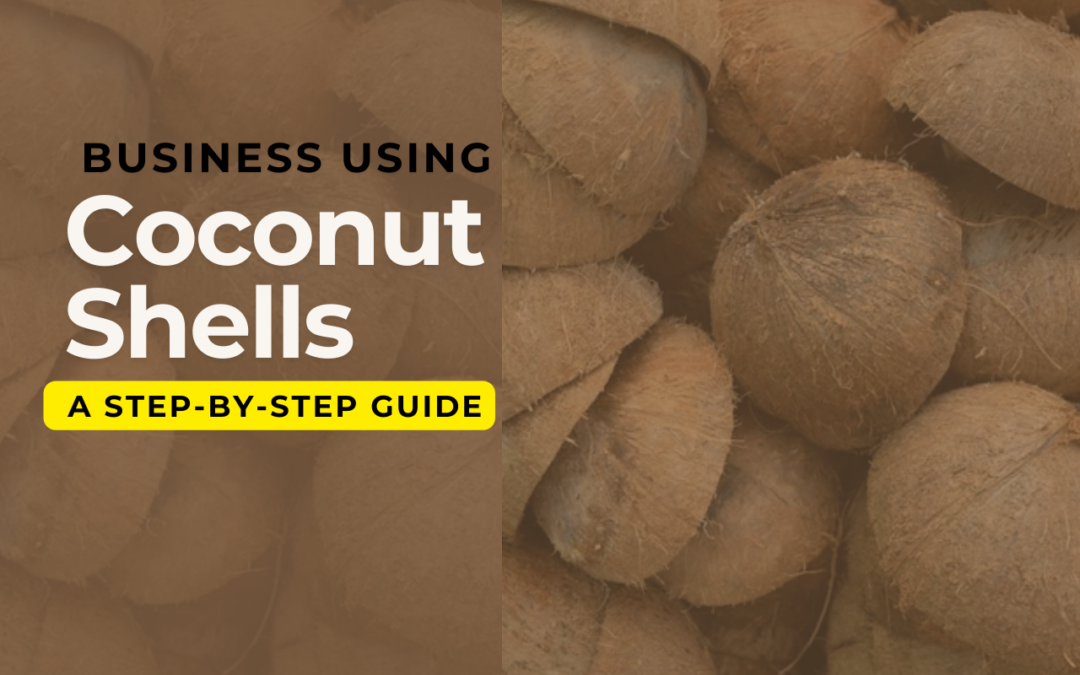The Coconut Shell Activated Charcoal Business is emerging as a profitable and sustainable venture, offering immense opportunities for entrepreneurs worldwide. With increasing demand for eco-friendly products, activated charcoal made from coconut shells is in high demand for water purification, skincare, healthcare, and industrial applications. If you’re considering entering this market, this guide will take you step-by-step through starting a successful Coconut Shell Activated Charcoal Business, from sourcing raw materials to selling your final product.
Why Choose Coconut Shells for Activated Charcoal?
Coconut shells are a renewable and cost-effective raw material for producing activated charcoal. They are:
- Environmentally Friendly: Coconut shells are a waste byproduct of the coconut industry, reducing waste.
- High Carbon Content: Coconut shells yield high-quality activated carbon with superior adsorption properties.
- Abundantly Available: Countries like India, Indonesia, the Philippines, and Thailand are major coconut producers, ensuring a steady supply.
Given its versatility, the Coconut Shell Activated Charcoal Business caters to industries like water treatment, air purification, cosmetics, and medicine.
Step 1: Conduct Market Research
Before starting your Coconut Shell Activated Charcoal Business, conducting thorough research is essential. Consider the following:
- Global Demand: Activated charcoal is widely used for water filtration, detox products, and industrial applications.
- Target Markets: Identify key industries in your region or export markets that require activated charcoal.
- Competition Analysis: Research competitors to understand their pricing, distribution strategies, and product quality.
High-ranking markets for activated charcoal include the United States, Europe, the Middle East, and Asia-Pacific. With increasing awareness of eco-friendly products, demand is set to grow.
Step 2: Essential Equipment for Setting Up a Coconut Shell Activated Charcoal Production Unit
To produce activated charcoal efficiently, you need the right equipment. Here’s a list of essential machinery:
- Carbonization Kiln: Used to carbonize coconut shells at high temperatures.
- Activation Furnace: Enhances the adsorption properties of charcoal.
- Crusher and Grinder: Pulverizes the carbonized shells into fine particles.
- Screening Machine: Sorts activated charcoal based on size.
- Packaging Machine: Packs the final product into bags or containers for distribution.
- Conveyor Belt System: Transports materials between stages.
Ensure your equipment is energy-efficient and eco-friendly to maintain a competitive edge in your Coconut Shell Activated Charcoal Business.
Step 3: How to Source and Process Coconut Shells for High-Quality Activated Charcoal
Sourcing Coconut Shells
- Partner with coconut farms, processors, or suppliers to secure a consistent raw material supply.
- Negotiate bulk rates to reduce costs.
- Ensure the shells are clean and free from coconut meat residue.
Processing Steps
- Drying: Remove moisture from coconut shells to prepare for carbonization.
- Carbonization: Heat the coconut shells in a kiln under controlled temperatures (600-900°C) in the absence of oxygen. This step produces charcoal.
- Activation: Treat the carbonized shells with steam or chemicals at high temperatures to increase porosity.
- Grinding and Screening: Crush the activated charcoal and sort it into different sizes based on industry needs.
- Quality Testing: Check the adsorption rate, ash content, and moisture levels to ensure high product quality.
Maintaining quality standards is critical for success in the Coconut Shell Activated Charcoal Business.
Step 4: Market Demand and Opportunities for Activated Charcoal Businesses Worldwide
Growing Demand
Activated charcoal’s versatility ensures global demand across several industries:
- Water Purification: Used in water filters and treatment plants.
- Cosmetics and Skincare: Popular in face masks, soaps, and toothpaste for detox and cleansing.
- Healthcare: Used as an antidote for poison and in dietary supplements.
- Air Purification: Filters harmful gases and odors.
- Industrial Applications: Employed in gold recovery, gas purification, and oil refining.
Opportunities for Entrepreneurs
- Export to high-demand regions such as the USA, Europe, and Asia.
- Partner with skincare and healthcare brands for product supply.
- Develop private-label products for water filtration companies or cosmetic brands.
The global market for activated charcoal is projected to grow significantly, making the Coconut Shell Activated Charcoal Business a lucrative opportunity.
Step 5: Marketing Strategies for Your Activated Charcoal Business
Effective marketing is crucial for attracting buyers and scaling your business. Here are proven strategies:
- Create a Strong Brand Identity: Highlight your product’s eco-friendly nature and high quality.
- Leverage Digital Marketing:
- Build a professional website showcasing your products, certifications, and customer testimonials.
- Use Search Engine Optimization (SEO) to rank for keywords like “activated charcoal suppliers” and “coconut shell charcoal.”
- Run paid ads on Google and social media platforms.
- Target B2B Buyers:
- Reach out to water treatment plants, skincare brands, and healthcare companies.
- Attend trade fairs, exhibitions, and B2B events to network with potential buyers.
- Educate Your Audience:
- Share content about the benefits and applications of activated charcoal.
- Write blogs, case studies, and videos to position yourself as an industry expert.
Step 6: Marketing Platforms to Promote Your Coconut Shell Activated Charcoal Business
To maximize reach and sales, focus on the following platforms:
- B2B Marketplaces:
- List your products on platforms like Alibaba, IndiaMART, and TradeIndia.
- Social Media:
- Promote your business on LinkedIn, Facebook, Instagram, and YouTube to target diverse audiences.
- E-commerce Platforms:
- Sell your activated charcoal through platforms like Amazon, eBay, and Shopify.
- Google My Business:
- Optimize your Google business listing to attract local and international buyers.
- Industry-Specific Forums:
- Join online communities and forums to connect with potential clients and suppliers.
Utilize a mix of these platforms to build brand awareness and generate leads for your Coconut Shell Activated Charcoal Business.
Step 7: Pricing Structure for Coconut Shell Activated Charcoal
The pricing of activated charcoal depends on various factors, including production costs, quality, and market demand. Here’s a basic breakdown:
- Raw Material Costs: Sourcing and transporting coconut shells.
- Production Costs: Energy, labor, and machinery maintenance.
- Packaging and Transportation: Bagging, labeling, and shipping expenses.
- Profit Margin: Add a 20-40% profit margin depending on competition and market positioning.
Average Prices
- Bulk Activated Charcoal: $1,000 – $2,500 per ton (depending on quality and origin).
- Retail Products: Small packs for cosmetic or healthcare use can be priced at $10 – $30 per unit.
Offer competitive pricing without compromising quality to establish a strong market presence.
Conclusion
Starting a Coconut Shell Activated Charcoal Business is not only profitable but also environmentally sustainable. With rising demand across various industries and global markets, there is immense potential for growth. By sourcing quality raw materials, using efficient production methods, and implementing strategic marketing, you can build a successful activated charcoal business.
Take the first step today by conducting market research, investing in essential equipment, and focusing on delivering high-quality products. As you scale, the Coconut Shell Activated Charcoal Business can help you tap into global markets and achieve long-term success.
Ready to start your journey? Begin sourcing your coconut shells and make the most of this booming industry!












